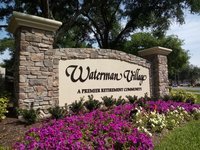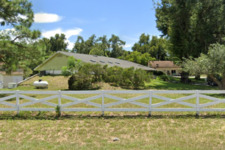Mount Dora is part of the Orlando-Kissimmee metropolitan area in central Florida. The city has a population of around 14,500 people, approximately 34% of whom are seniors aged 65 and older. There are plenty of things to do in Mount Dora, including hiking at Lake Dora and picnicking at Trimble Park. Seniors may also enjoy visiting Renninger’s Vintage Antique Center and Farmer’s Flea Market, which has antiques, collectibles and crafts from local vendors and fresh fruits and vegetables when in season.
Five assisted living communities are available within city limits for retiring seniors who need help with the activities of daily living. These facilities have an average monthly cost of $4,950.
Note: Data for Mount Dora was unavailable, so data for the nearest city, The Villages, was used instead.
Hundreds of thousands of American seniors utilize assisted living, a figure that is only growing. For these seniors, assisted living combines residential housing,assistance in daily activities, and some healthcare. These communities also strive to provide an atmosphere that is comfortable and engaging for their residents… Read More >
According to Genworth Financial’s 2020 Cost of Care Survey, the average monthly cost of assisted living in Mount Dora is $4,950. This is $650 more than the national average of $4,300 and $1,250 higher than the state average of $3,700. Comparing the cost of surrounding states, assisted living in Mount Dora is more costly than in Georgia, Alabama and South Carolina, where seniors pay $3,500, $3,150 and $3,988, respectively.
The average cost of assisted living varies throughout the state. Mount Dora has some of the most expensive rates, while the Tampa Area is one of the least expensive cities in the state for assisted living at $3,225. Further south, Miami has an average cost of $3,500, while in the northeast corner of the state in Jacksonville, costs are about $4,150. In the central portion of Florida, Palm Bay facilities cost around $4,100, and in Pensacola, to the northwest, seniors pay approximately $3,805 per month for assisted living care.
Florida offers a Medicaid waiver to help low-income seniors pay for home and community-based services in long-term care facilities. The Statewide Medicaid Managed Long-Term Care Program waiver pays for services, such as grooming, housekeeping, staffing, meal prep and assistive devices.
Learn more about the Statewide Medicaid Managed Long-Term Care Program and how to apply on our Assisted Living in Florida page.
| Contact | Description | |
| Mid-Florida Area Agency on Aging | (352) 378-6649 | The Mid-Florida Area Agency on Aging is a nonprofit corporation that provides services to seniors and people with disabilities in North Central Florida. Available services include an elder helpline, aging classes, health and wellness programs, benefits counseling and an information database. |
| Florida Long-Term Care Ombudsman | (888) 831-0404 | The Florida long-term care ombudsman acts as an advocate for seniors in long-term care. The ombudsman makes routine facility checks to ensure all facilities are maintaining the standards set by federal and state laws. The ombudsman also investigates complaints made against facilities and seeks a resolution on behalf of the residents and their families. |
| Lake County Transit | (352) 742-2612 | Lake County Transit provides door-to-door transportation to and from medical appointments, errands and outings for area seniors. All vans are wheelchair-accessible, and all fares are at reduced rates. |
| Lake County Veterans Services | (352) 742-6585 | The Lake County VA helps prior military members and their families sign up for available benefits and services. This includes insurance counseling, health care, education, home loans and transition services. The VA can also help families locate national cemeteries for burials and memorials. |
| Eustis Senior Center | (352) 326-5304 | The Eustis Senior Center provides a variety of classes and programs for area seniors. The center is open to those aged 55 and older throughout the week and on weekends. Programs include arts and crafts, games, health and fitness classes and meals. The center also plans frequent outings for its members within the community. |
The Agency of Health Care Administration regulates assisted living communities in the state of Florida. The administration sets rules in regard to staffing, health and safety, medication administration and quality of care. Learn more about the laws and standards on our Assisted Living in Florida page.

















